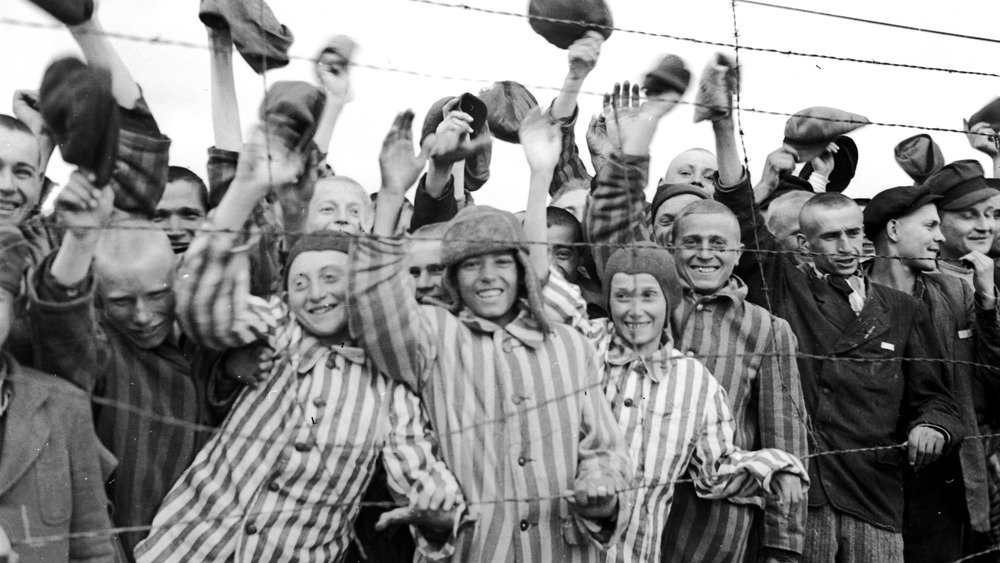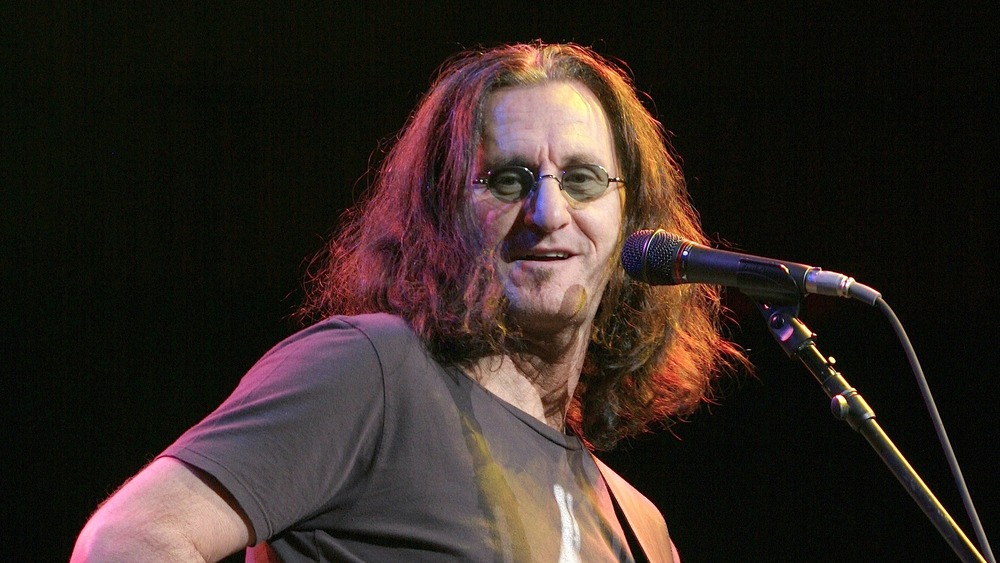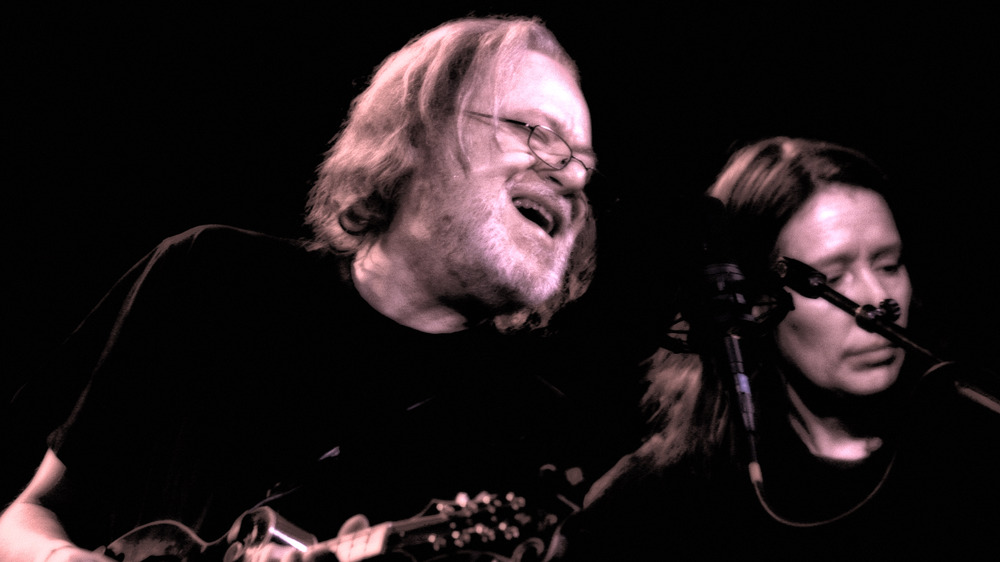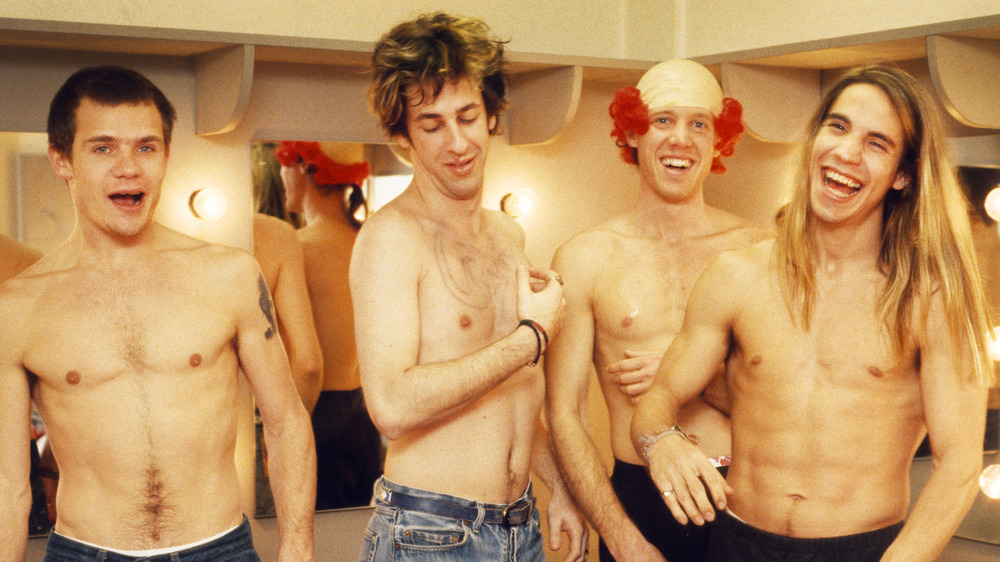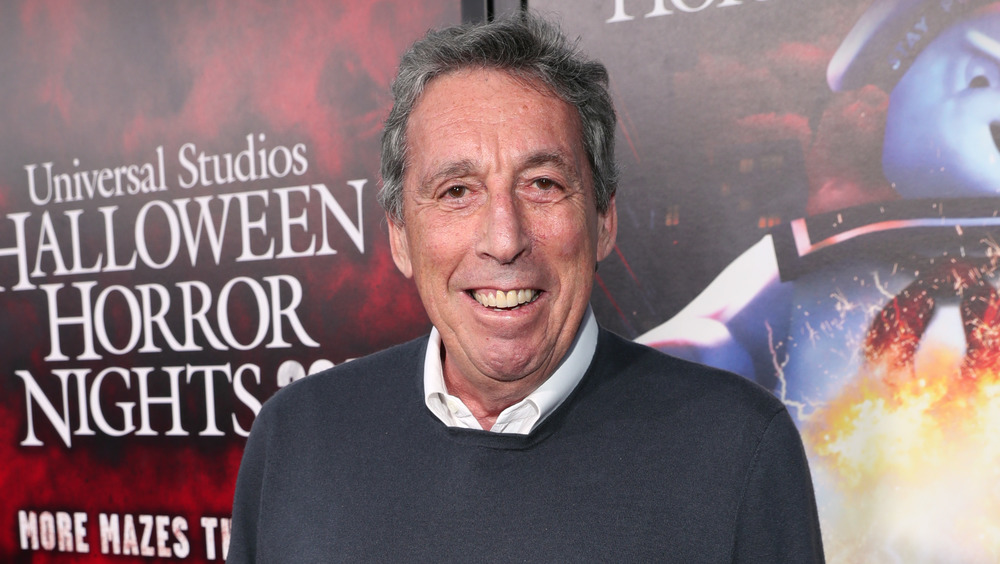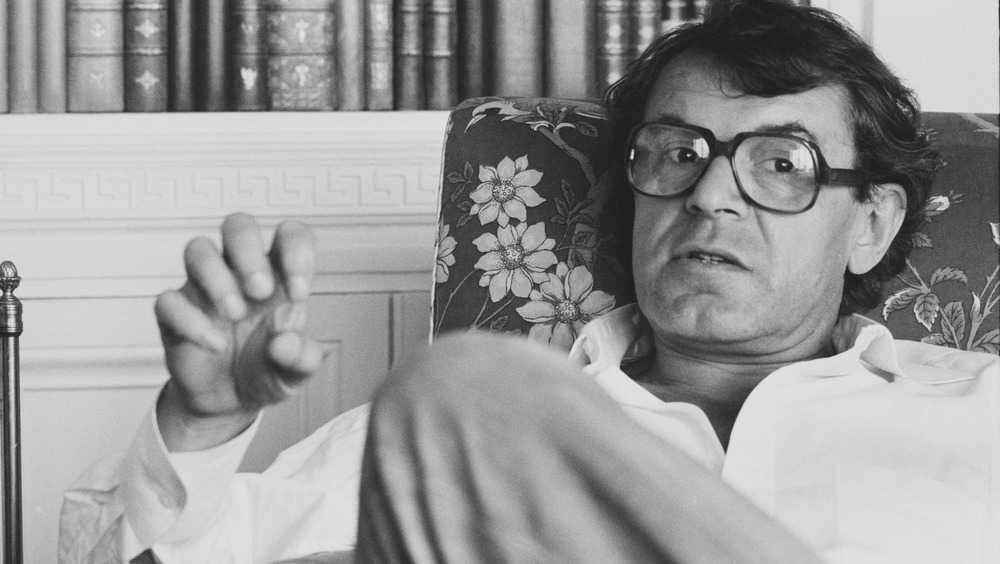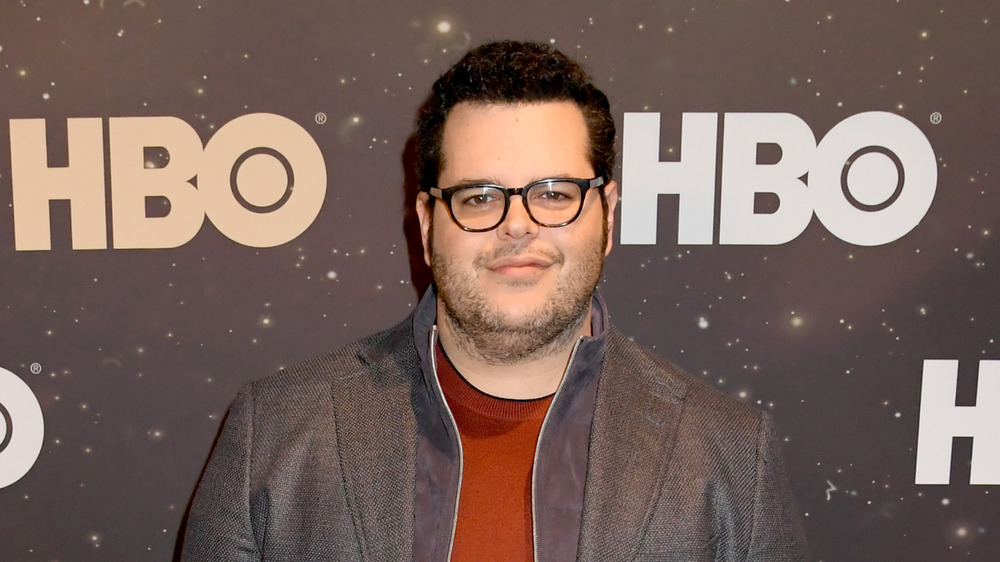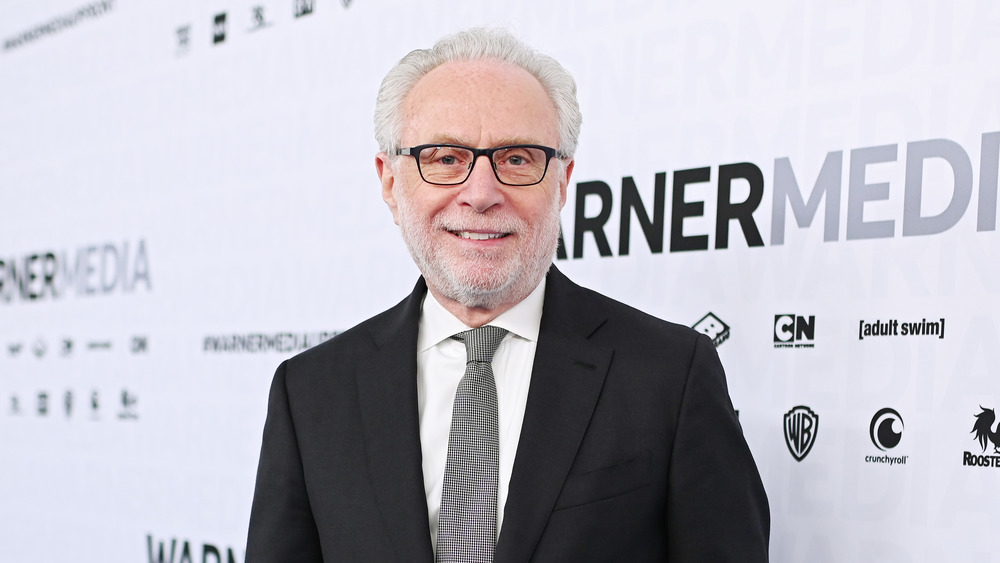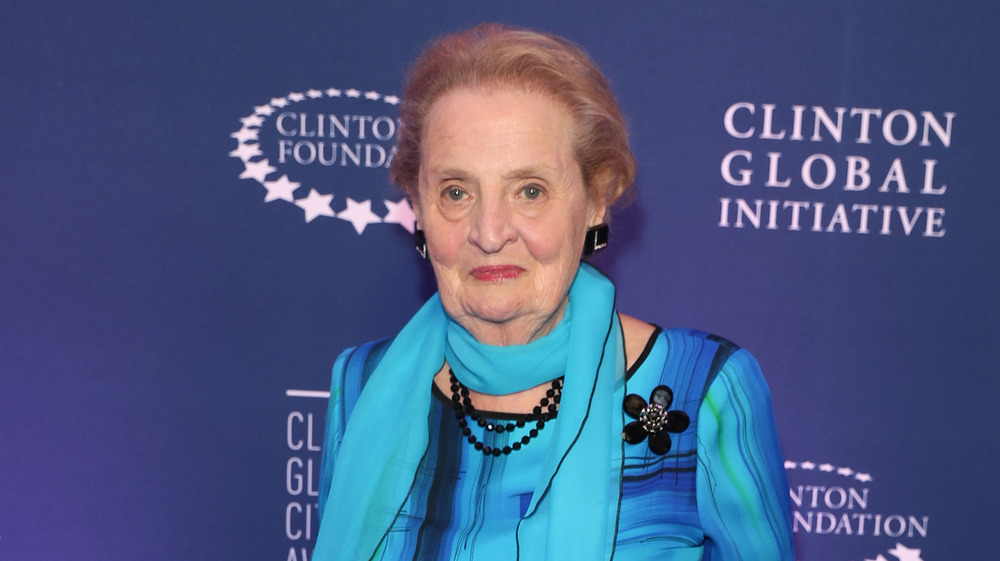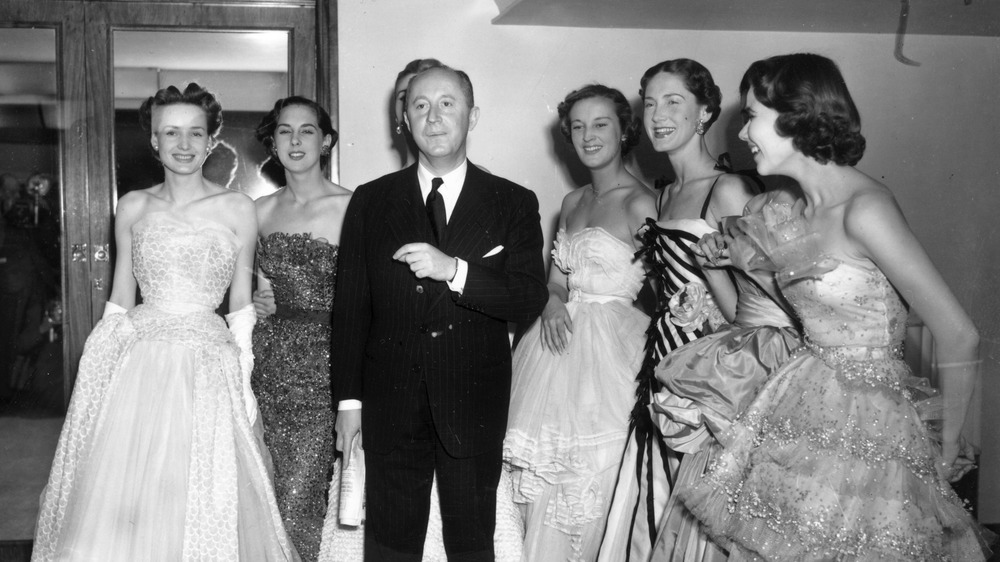Celebrities With Family Members Who Survived The Holocaust
We use the term "Holocaust" to describe the period in which the Nazis persecuted and murdered the Jewish people along with homosexuals, Roma, and anyone they deemed unfit, including those who were part of the resistance. While there are many stories of famous people who had family members who lived during the Holocaust, there are very few stories of those who survived. Many folks survived by escaping Nazi occupation early on, while others managed to live through one or more concentration camps.
The gamut of those influenced by their surviving family runs from famous musicians to directors to actors to politicians. It is hard to separate these celebrities from their history and what inspired them to be the remarkable people they are today and the legacy they continue to leave. For the punk scene, there is a theory that punk was inspired by the undealt-with emotions of the Holocaust. For directors, the remnants of that time is expressed in their aesthetic. Actors find joy in their gratitude for the life they get to live because of their family. And politicians are able to have a point of view others might not have — the ability to see how words and hate can lead to dangerous consequences.
Gene Simmons, singer and bassist for the band Kiss
Gene Simmons is most famous for performing with the glam rock band Kiss. A lesser-known fact is that his mother, Flora Klein, was a Holocaust survivor. Simmons understood little about what his mother went through because she didn't like to talk about it. As Arlene Nisson Lassin, who had an encounter with Flora on a plane, wrote for HuffPost, "Flora faced me again with a stone face. 'My dear, I can never unlock that door and bring up those memories, because if I did, I would go crazy and never come back,' she said."
In March 2020, Bild am Sonntag, a popular German newspaper, published an article detailing information they gave Simmons about his mother's experience. Flora survived a Budapest ghetto and three different concentration camps. She was liberated in 1945 at age 19. According to one of the documents found, Flora stated, "As of March 1944, I — like all Jews in Budapest–– had to wear a yellow Jewish badge on my chest at the behest of the German authorities."
In his interview with Bild am Sonntag, Simmons said, "My mother told me why she had survived. When she was a 12-year old girl, she came to a hairdresser and learned how to cut hair. The SS commander's wife needed someone to do her hair." When being interviewed for the position, she was asked if she spoke German. Supposedly, anyone who said "yes" went to the gas chamber. While Flora knew some German, she did not admit it. Flora died in 2018 at age 93.
Geddy Lee, Rush frontman
Geddy Lee is the Canadian-born lead singer, bassist, and keyboardist for the band Rush. According to an interview Lee did for Q104.3 in New York, his parents, Morris and Mary Weinrib, both around age 13, met in Poland at a Jewish work site before the concentration camps were fully functioning. He said, "...they would joke around and flirt as kids would, no matter what the circumstance, and they sort of had a crush on each other." They were imprisoned at Auschwitz together for a few years until Morris was transferred to Dachau, and Mary was later transferred to Bergen-Belsen.
After Morris' departure, Mary survived Auschwitz with her mother, sister, and grandmother. According to Ultimate Classic Rock, reporting on the Q104.3 interview, Lee also detailed a story he heard from his grandmother: "[Nazi guards] would line them up every day. They would go 'left, right, left, right.' If you went to one direction, you went to the gas chambers. If you went to the other direction, you went to work." Mary's mother lined them up so they would all go the same direction. "She believed that if they were all going to perish, they would perish together, and if they were all going to survive, they would survive together. My grandmother was an amazing person; she kept them alive throughout their time in the camps." Lee's parents reunited after the war, married, and began their new life in Canada.
Tommy Ramone, drummer, founder, and producer of the band the Ramones
Tommy Ramone was born Tamás Erdélyi in Budapest — but adopted the surname "Ramone" like all members of the Ramones. According to Hungary Today, Ramone's parents were both professional photographers and survived the Holocaust with the help of neighbors, who hid them. Ramone and his family came to the US in 1957, fleeing the Hungarian Revolution, and ended up in Queens, New York. That's where Tamás Erdélyi met John Cumming (aka Johnny Ramone).
The Ramones' music would often allude to Nazis and World War II, in songs such as "Blitzkrieg Bop" and "Bonzo Goes to Bitburg." When asked about this in an interview with The New York Times, Tommy Ramone said, "To bring forbidden things, horrible things, and make art of it was basically an artistic thing. There's an aesthetic effect when you take your deepest fears and try to get a grasp on it and try to make humor out of it." According to National Review, discussing the book The Heebie-Jeebies at CBGB's: A Secret History of Jewish Punk, "Beeber [the author] at one point says, 'no Holocaust, no punk,' and there's something to this. I.e., the bleakness and anger of punk is to some degree explained as a belated psychic response to Hitler's slaughter, one that had been typically repressed from '46 up through the 60s."
Hillel Slovak, guitarist and founder of the Red Hot Chili Peppers
Hillel Slovak, originally born in Israel, grew up in Los Angeles, where he met Anthony Keidis and Flea at Fairfax High School. His mother was Polish, his father was from Yugoslavia, and both of them survived the Holocaust. While not much information is available on his parents' history, one has to wonder how their lives might have influenced the energy of the Red Hot Chili Peppers' music, in the same way it influenced the Jewish punk rock movement of the '70s. According to Tablet, when he was asked about what the band's antics stood for, Slovak said, "It stands for spontaneity. On tour, a lot of ridiculous anarchistic — something we do — it's just a release because on tour is a very good place to build up a lot of strange energies."
In 1988, at age 26, Hillel died of a heroin overdose. According to Tablet, the Red Hot Chili Peppers song "Under the Bridge" was in part inspired by the sadness of losing Hillel, who was the creator and spirit of the band. When discussing the band's induction to the Rock and Roll Hall of Fame with Rolling Stone, Anthony Keidis stated, "The most emotional part for me was thinking about Hillel Slovak." He went on to say, "He's a beautiful person that picked up a guitar in the 1970s and didn't make it out of the 1980s, and he is getting honored for his beauty."
Ivan Reitman, film director and producer
Ivan Reitman is a Hollywood filmmaker, famous for films such as Animal House, Stripes, and Ghostbusters. Reitman, according to Forward, "was born in Czechoslovakia in 1946, shortly after his parents, Leslie and Clara, barely managed to survive the Holocaust." When he was very young, Ivan and his parents emigrated to Canada to escape the religious intolerance that endured even after their liberation.
When asked by the Toronto Star about how his family's history affects his filmmaking, Reitman said, "Look, I'm an immigrant. I escaped Czechoslovakia with my parents in 1950. We're Holocaust survivors. So my whole thrust was to entertain." Ivan's son, Jason Reitman, is also a famous filmmaker known for Juno and Up In the Air. When comparing his and his son's style, Ivan said, "His DNA doesn't have the built-in worries that mine had. And he was able to concentrate on doing things in a more insightful way. I think he looks at the internal story in a much more meaningful manner than I have had to do, or have desired to do."
Ivan Reitman contributed to the creation of the Bell Lightbox theater, which is the centerpiece of the Toronto International Film Festival. It also happens to stand in the exact spot where his father's car wash used to be. As reported by Forward, Ivan's father worked hard for years to own that car wash. He encouraged Ivan to chase his dreams, who in turn, encouraged his son, Jason, to do the same.
Milos Forman, Academy Award-winning film director
Milos Forman was famous for directing films such as One Flew Over the Cuckoo's Nest and Amadeus. According to The Times of Israel, Milos was born into a Protestant family in Czechoslovakia in 1932. Both of his parents, Anna and Rudolf Forman, who were named as resistance fighters, died in separate concentration camps. The Gestapo took his father away first, with Rudolf telling his son, "Tell her [Anna] everything's fine, and I'll be back." He never came back. Three years later, they came for his mother.
According to Prague Life, "After the war, Forman discovered, much to his surprise, that Rudolf Forman was not his biological father. Having believed that both of his parents died in the Holocaust, he now found that his biological father was a Jewish man named Otto Kohn, who survived the war." It was not until 1964, when he was in his thirties, that Forman learned about Kohn from a woman who was at Auschwitz with his mother. According to his obituary in the New York Daily News, Otto Kohn was an architect who fled to Ecuador from Czechoslovakia in 1939. He died in New York City in 1965 at age 77. It is unclear if he and Milos ever had the opportunity to meet. Milos lived in Czechoslovakia until 1968, when he fled to the US after the Soviet Invasion.
Mila Kunis, famous actress
Mila Kunis is best known for her roles in the TV series That '70s Show and the film Black Swan. What many people do not know is that Kunis was born in Ukraine and "had to hide the fact that she was Jewish for fear of persecution," according to the Independent. Her family moved to the US on a religious-refugee visa when she was only seven years old. According to the Toronto Sun, Mila had a friend in Russia who, in second grade, had a swastika painted on her chair at school. The message was clear to Mila, who said, "This is a country that obviously does not want you."
Mila stated, "My whole family was in the Holocaust. My grandparents passed [meaning they lived] and not many survived. After the Holocaust, in Russia, you were not allowed to be religious. So my parents raised me to know I was Jewish. You know who you are inside..." In an interview with Kveller, Mila said she doesn't consider herself very religious but does keep to the tradition of Shabbat. She said, "Friday night, we're all going to get together, and we're all just going to talk." She also plans to raise her children bilingual, knowing both English and Russian.
Gal Gadot, actress and model
Gal Gadot is most famous for playing the lead role in the film Wonder Woman. She was raised in Rosh Haayrin in Israel. According to The Washington Post, she was named Miss Israel at 18 years old and then served, as all Israeli citizens do, in the Israeli military. Her grandfather, Abraham Weiss, was a teenager when he was imprisoned at Auschwitz. MSN reported on a tribute Gadot made to him on Holocaust Remembrance Day. She wrote, "He lost his entire family because they were the 'wrong race' in someone else's opinion, and miraculously avoided his own untimely death 9 times!" Weiss lived to be 85 years old, and he died in 2013.
Every year, Gadot pays tribute to her "Saba." In 2018, she could not find a photo of him, but by coincidence, Gadot's assistant stumbled across an old video of him. According to The Jerusalem Post, Gadot said, "She had no idea today is the [H]olocaust [R]emembrance day, and didn't know I was looking for a photo of him/us all night. I wasn't surprised... My grandpa is always with me..."
Josh Gad, Broadway star and film actor
Josh Gad is most famous for playing the role of Elder Arnold Cunningham in Book of Mormon on Broadway and being the voice of Olaf in the film Frozen. In an interview Gad did with Inquirer.net, he stated, "My dad was a Jew who was born in Afghanistan. He was born there at a time when there was more tolerance." As the country grew more intolerant, his father's family moved to Israel. According to The Times of Israel, Gad thinks there's a strong possibility that his father is directly descended from the Tribe of Gad, one of the original 12 Tribes of Israel.
In 2017, Gad took the role in the film Marshall "as an opportunity to honor his grandparents, who survived the Holocaust." He expressed a wish that his grandparents were alive to see the film. As reported by People, Gad paid tribute to his grandfather, Joseph Greenblatt, who died in 2016: "Born in 1919, he fought through and survived the unthinkable during the Holocaust. After watching his entire family get slaughtered, he defied pure evil, and survived against all odds to meet my grandmother, another survivor, and build a whole new life in New York."
Wolf Blitzer, news anchor and journalist
Wolf Blitzer is most famous for being the head anchor of The Situation Room on CNN. What some may not know is that Blitzer was born in Germany to two Holocaust survivors. His parents Cesia and David Blitzer, both from Poland, survived Auschwitz. They "met on a train while traveling between Poland and Germany looking for surviving relatives," according to CNN.
According to the The Jewish Journal of Greater Los Angeles, Blitzer and his parents came to the US after the war, as the Displaced Persons Act of 1948 had opened the country to European victims of Nazi persecution. They settled in Buffalo, New York, where Blitzer grew up. He studied abroad in Jerusalem and worked as a reporter in Israel before becoming an anchor at CNN. When asked about how he feels about the US welcoming Muslim refugees, he said, "As a son of Holocaust survivors who came to the United States as refugees after World War II, I strongly believe in refugee resettlement. This country welcomed my parents, who went on to establish a wonderful life in Buffalo, N.Y."
Madeleine Albright, former secretary of state
Madeleine Albright is best known for her work as former secretary of state and US ambassador to the United Nations during Bill Clinton's presidency. According to an article written in 1997 for The Washington Post, "Madeleine Korbel Albright was almost 2 years old when her parents whisked her out of Czechoslovakia in March 1939, less than two weeks after the Nazi occupation." Albright didn't even know she was Jewish until she rose to prominence because of her position in Clinton's administration, and it was revealed to her by the Post article quoted above.
According to Salon, Albright's father, Josef Korbel, worked for the Czech government before the occupation. Josef moved his family to London, where he remained a part of the Czech government in exile. After the war, they returned to Prague, where he became the ambassador to Yugoslavia. Their family moved to the US in 1948 to escape the communist coup.
In 2012, Albright published a book, Prague Winter: A Personal Story of Remembrance and War, 1937-1948, in which she dives into what her family went through fleeing the war, as well as those who were not so lucky. According to The Washington Post, reporting on the release of this book, 25 of her family members who died in the Holocaust. On the surface, it's easy to assume the Korbels' early assimilation and escape did not make them a target, but Albright "gained access to German secret police records that described her father as the 'Jew Korbel,' and she was unnerved to discover that the police knew their address in England."
Christian Dior, fashion designer
Christian Dior was a fashion designer and creator of top fashion house Dior. He fought for the French during World War II and completed his service in 1942. After, he went to work as a head designer for Lucien Lelong. According to Vogue UK, "Lelong — like other French ateliers [...] — dressed the wives of Nazi officers and French collaborators as a way of preserving the fashion industry throughout the conflict for both economic and artistic reasons." Meanwhile, as early as 1941, his sister Catherine Dior — who would later be the inspiration for his first fragrance, "Miss Dior" — was working undercover as a spy for the resistance.
Per The Telegraph, that was the year Catherine met Hervé des Charbonneries, who was a founding member of the resistance. Catherine worked as a spy, gathering and delivering information until June 1944, when the Gestapo arrested her. According to Jezebel, "She was put on one of the last trains out of Paris, which departed on August 15, just days before the liberation of the city began." Catherine was sent to the Ravensbruck concentration camp. She was liberated in 1945 and awarded the Croix de Guerre, something normally only given to those in the military.
